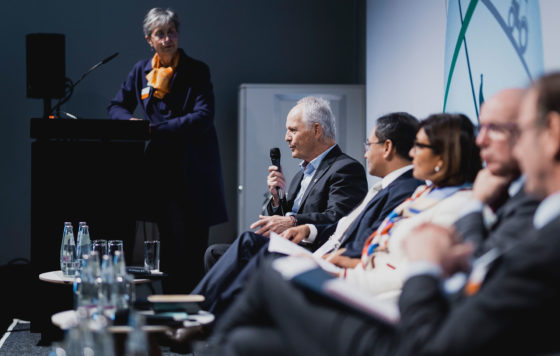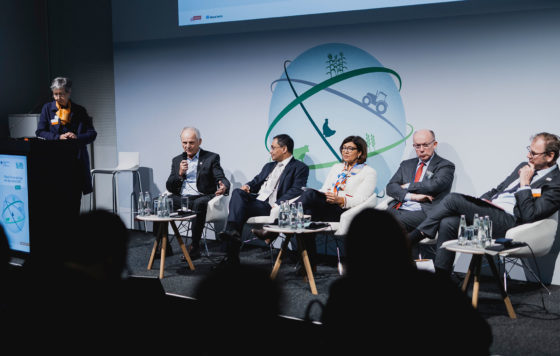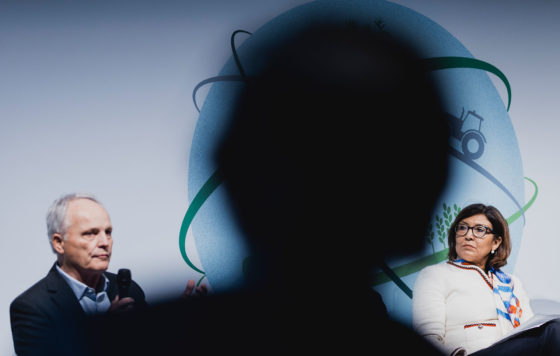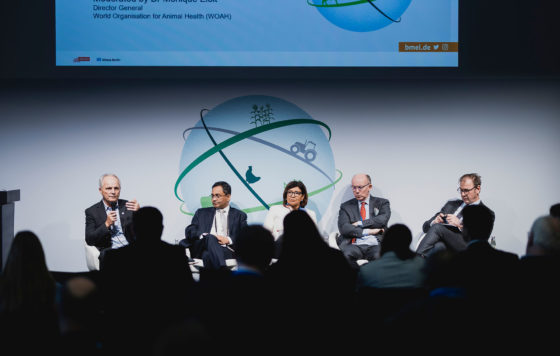Animal health: a substantive input to the transformation of food systems through the One Health approach

World Organisation for Animal Health (WOAH)
Time: Friday, 20. January 2023, 11:30 a.m. – 1:00 p.m.
Room: M8
Languages: English, German
Summary:
The event organised by the World Organisation for Animal Health (WOAH) discussed the substantive input of Animal Health to the transformation of food systems through the One Health approach. Monique Eloit, Director General of WOAH, moderated the panel comprising the following panellists:
- Maria Helena Semedo, Deputy Director General, Food and Agriculture Organization
- Arnold Puech D’Alissac, President, World Farmer Organisation
- Dieter Schillinger, Deputy Director General, International Livestock Research Institute
- Martien van Nieuwkoop, Global Director Agriculture and Food Global Practice, World Bank
- Samuel Thevasagayam, Deputy Director, Livestock Team, Bill & Melinda Gates Foundation
The panel underscored the importance of animal production and health in food systems, identified the main drivers for health crises in production systems, and explored challenges for smallholder farmers. The lessons learned from past health crises – COVID-19 and HPAI – offered tangible solutions. The panel concluded that improving animal health is critical to ensure that animal diseases do not extensively impact health, livelihoods, and the environment; conversely, they underlined that globalisation, production, and climate change extensively impacts animal health.
The food systems of tomorrow should be holistic, multisectoral, inclusive, and sustainable. The One Health approach offers a framework for transformation for everyone’s health!
Panel Guests
Bureau member of the Fédération national des syndicats d’exploitant agricoles (FNSEA), he represented the European Constituency on the WFO Board from 2017 to 2022, also serving as the Treasurer and Vice President of the Organisation.
He also held the position of President of the European Council of Young Farmers (CEJA) from 1999 to 2001.
His motto is “Tout seul, on va plus vite, ensemble, on va plus loin”.
Honors and awards
November 2019:
- Receives the Crans Montana Forum Prix de la Fondation
December 2018:
- The Government of Brazil bestows the honorific Order of Rio Branco
- The Universidade Aberta in Lisbon confers the Honoris Causa doctorate for her work in global sustainable development
March 2018:
- Named “Woman of the Year” at the commemoration of the 2018 Women Diplomats Day in Portugal
May 2008:
- Receives the Order of Niger for her distinguished service to the field of agriculture
Moderation
From the very first years of her work, Dr Eloit had to deal with sensitive issues such as the transport and slaughter of livestock, at both the national level and at European Community level, and participated in the first European negotiations on these topics. In 1992, she was placed in charge of the launch of the programme for the oral vaccination of foxes against rabies, which in several years enabled the disease to be eradicated in France.
During the 1990s, she occupied successively the positions of Assistant to the Deputy Director for animal health and protection, in which capacity she participated in setting up the national agency for veterinary products (ANMV), and Deputy Head of the Department for food quality and veterinary and plant health actions. For over six years she also acted as Chairperson of the Standing Committee of the European Convention for the protection of animals kept for farming purposes (T-AP), at the Council of Europe.
At the beginning of the new millennium, Dr Eloit was appointed Director at the French Food Safety Agency (Afssa). In this capacity she helped to reform the expert committees, supervised national veterinary laboratories with regard to their scientific and technical support activities, and represented Afssa on the European Food Safety Authority (EFSA) Committee of national agencies. She was also in charge of the “bioterrorism” dossier, which involved making some of the Agency’s laboratories available for controls on suspicious products.
In 2005, she returned to the Ministry of Agriculture, holding three appointments simultaneously, as Deputy Director General for Food, Chief Veterinary officer (CVO) of France and Delegate to the OIE. During the four years that followed, she had to deal with many sanitary crises, including managing the avian influenza crisis, the foot and mouth disease and bluetongue epizootics and various food safety emergencies. Her duties as CVO and Delegate to the OIE involved working at a national level but also at a regional and international level.
After these years of experience, she joined the OIE in 2009, as Deputy Director General in charge of administration, management, human resources and regional actions. In addition to playing a leading role in institutional relations with Member Countries and with international organisations having an agreement with the OIE, she also supervises the activities of the OIE Regional and Sub-Regional Representations. During these past six years, she has also overseen the reform of the OIE’s accounting and financial procedures and made a significant contribution to the preparation of the OIE’s Sixth Strategic Plan for the period 2016-2020.
Dr Eloit was born in 1958 and is the mother of two children. Her husband is an eminent professor of virology at Alfort national Veterinary School and a researcher at the Pasteur Institute. Dr Eloit’s thirty years of solid professional experience have given her an invaluable knowledge of all aspects of animal health and welfare. She took over as Director General of the OIE on 1 January 2016. By so doing she became the 7th Director General of the OIE, and the first woman to hold the position.






